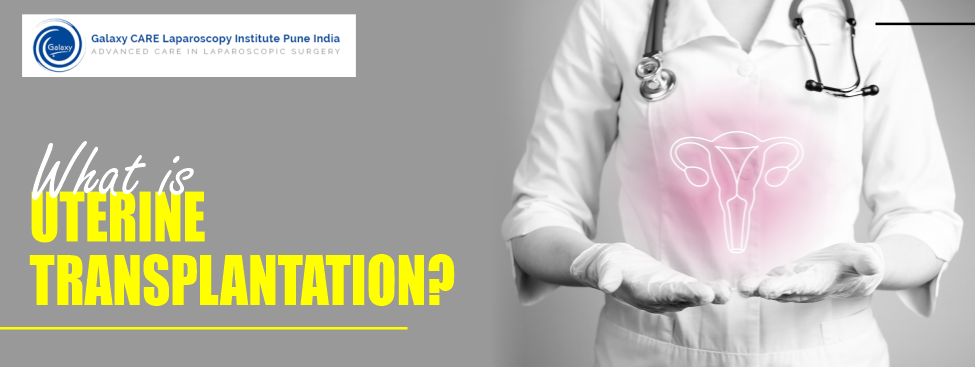
WHAT IS UTERINE TRANSPLANTATION?
Advancements in medical science have paved the way for groundbreaking procedures that were once considered impossible. One such remarkable innovation is uterine transplantation, a procedure that offers hope to women who are unable to conceive due to uterine factor infertility. As the best hospital with Laparoscopy Gynec Surgery in Pune, we understand that the concept of uterine transplant is still relatively new. Through this blog, we will delve into the concept of uterine transplantation, understand the process involved and its benefits. Let’s begin!
What is Uterine Transplantation?
Uterine Transplantation is a complex surgical procedure that involves the transfer of a healthy uterus from a living or deceased donor to a woman who has an absent or non-functioning uterus. This procedure aims to provide women with the opportunity to carry and deliver their child, thereby fulfilling their desire for motherhood.
The Process of Uterine Transplantation
The process of uterine transplantation typically involves the following key steps:
1. Donor Selection: In the case of living donors, potential candidates undergo a rigorous screening process to ensure their suitability. Factors such as age, overall health, and compatibility are carefully assessed. In deceased donor cases, the transplantation is typically performed soon after the organ becomes available.
2. Surgical Procedure: The surgical procedure for uterine transplantation involves removing the uterus from the donor and implanting it into the recipient. This intricate procedure requires highly skilled surgeons who specialise in transplant surgeries.
3. Post-Transplant Care: Following the surgery, the recipient undergoes a period of close monitoring and intensive post-transplant care. Immunosuppressant drugs are prescribed to prevent organ rejection. Regular check-ups and follow-ups are essential to ensure the success of the transplant.
4. IVF and Pregnancy: Once the transplanted uterus has healed and the recipient is deemed ready, in vitro fertilisation (IVF) is performed to achieve pregnancy. Embryos created through IVF are implanted into the transplanted uterus, allowing the recipient to conceive and carry a child to term.
Benefits and Considerations of Uterine Transplantation
Uterine transplantation offers numerous benefits to women who desire to experience pregnancy and childbirth. Some of these benefits include:
1. Restored Fertility: Uterine transplantation provides women with the opportunity to carry and deliver their child, fulfilling their dreams of motherhood.
2. Psychological Well-being: For women who have always longed for the experience of pregnancy, the ability to conceive and carry a child can have a profound positive impact on their mental health and overall well-being.
3. Advancement in Reproductive Medicine: Uterine transplantation represents a significant milestone in the field of reproductive medicine, opening new doors for future research and advancements.
Risks Associated with Uterine Transplant
However, it is crucial to consider certain factors when contemplating uterine transplantation:
1. Surgical Risks: Like any major surgery, uterine transplantation carries risks, including infection, bleeding, and anesthesia-related complications. Thorough evaluation and informed consent are vital before undergoing the procedure.
2. Immunosuppressant Medications: To prevent organ rejection, recipients are required to take immunosuppressant medications for an extended period. These medications may have side effects and require careful monitoring.
3. Ethical Considerations: The availability of suitable donors, the ethical implications of organ transplantation, and the long-term impact on both the donor and the recipient must be carefully considered.
Galaxy Care Hospital: Pioneering Uterine Transplantation in India
Galaxy Care Hospital, known for the Best Laparoscopic Gynae Surgery in Pune, holds the distinction of being the first hospital in India to successfully perform a uterine transplant. Led by Dr. Shailesh Puntambekar, a renowned gynaecological laparoscopic surgeon, the hospital has achieved several milestones in reproductive medicine. Dr. Puntambekar and his team at Galaxy Care Hospital conducted the first uterine transplant surgery in India in May 2017. The recipient, a 21-year-old woman who was born without a uterus, received the organ from her mother. The surgery was a resounding success, and in 2018, the hospital celebrated the birth of the first baby in India through a uterine transplant.
The success of Galaxy Care Hospital’s uterine transplant program can be attributed to the exceptional expertise of its medical team, state-of-the-art infrastructure, and meticulous patient care. The hospital’s commitment to pushing the boundaries of medical science has made it a beacon of hope for women struggling with uterine factor infertility.
Conclusion
Uterine transplantation has emerged as a groundbreaking procedure, offering hope and a chance at motherhood to women with uterine factor infertility. Galaxy Care Hospital, as the first hospital in India to successfully perform this procedure, has paved the way for others to follow suit. While uterine transplantation comes with its own set of risks and considerations, it represents a remarkable achievement in reproductive medicine and provides a glimmer of hope to countless women worldwide. Book your appointment today!


